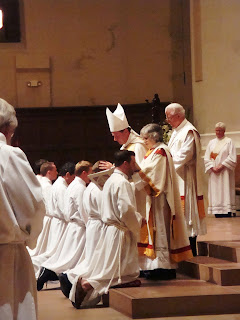Yesterday
evening, on the feast day of St Luke, I was ordained transitional deacon. This
is an important point on a long journey for me into ministry, into the
Episcopal Church, and eventually into priesthood. There were many important
moments for me in the service. But two stand out clearly for me.
As I vested, I was intentionally aware of all
that had formed me for this moment—my childhood desire to serve Jesus, a
pilgrimage to Ely, Lindisfarne, and Northumbria, my mentors and home parish, my
seminary, and my congregation outside in Boston. I heard the music start and we
unevenly made our way out into the procession. As my feet hit the stone floor
of the cathedral, I was vividly reminded of my walk through the Ely Cathedral,
walking along a pilgrim way that had been in use for over a thousand years. I
felt the sudden presence of mystery and of a cloud of saints who had inspired
me. Etheldreda, patroness of Ely, a woman who fled her position as Saxon
princess to found a double monastery in early Britain. Hilda, the great Celtic
saint and woman church leader who trained on Lindisfarne and finally hosted one
of the most important church councils in 664. St. Francis, the Blessed Virgin
of Guadalupe, Oscar Romero, so many. It seemed as if a whole host of ancient
women (and men) who had paved the way for me gathered around me, invisible
among the group of women from my home parish and discernment group who were
there to present me.
When, later
in the service, I knelt to receive the laying on of the bishop’s hands, I once
again became aware of this cloud of witnesses. Not only the women of ancient
Celtic Christianity and saints of history, but all of those who have mentored me and prayed for me
seemed to come around close. Some were there, sitting in the pews behind me—others
were spread out all over the country. I felt their presence through the miles separating
us. And, suddenly very close, was the outdoor congregation I served with in
Boston. It was here, on the streets, that I most fully found my call. The faces
of these folks, who had formed me, who had prepared me for ministry, who had
taught me what faith means in the most difficult circumstances, who had taught
me to live as a pilgrim, and who were even now praying for me—I felt them
present with me.
As the
bishop said the words; “Make her a deacon in your church,” tears came to my eyes.
I overwhelmingly felt that I was there, at that moment, because of those who
had formed me and blessed me on this journey.

